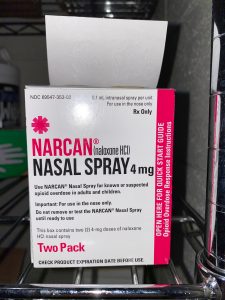Extras News
Oxford Continues to Struggle with Drug Overdoses

By Mallori Baker
The Daily Mississippian

After 2020, a deadly year in which 10 people suffered fatal drug overdoses, Oxford Chief of Police Jeff McCutchen said that the Oxford Police Department has received fewer calls about overdoses in recent months.
However, it’s not because drug use has declined.
“We are finding Narcan at houses,” he said.
Narcan is a nasal spray that blocks the opioid receptors in the brain and reverses the symptoms of an opioid overdose.
“We are still facing the issue, the overdose issue is still there, people are still getting these prescription pills on the street laced with Fentanyl — but now we are not answering (as many) unresponsive calls because people are using Narcan more,” McCutchen said.
Last April, all sorority and fraternity presidents at the University of Mississippi were given Narcan training and a supply to keep in their houses in case of an emergency.
“Narcan is just another safety precaution we take here. Hopefully we never have to use it, but if we ever did, it could save a life, so we always keep it in a known, easy to access location” said Clay Welch, a sophomore biological science major and member of Beta Theta Pi fraternity.
Narcan is not only easily accessible for members of Greek life on campus, but it is also easy to administer.
“It’s really as easy as taking it out of the packaging, inserting the syringe into the person’s nostril and pushing the plunger in to administer the medicine,” said Welch.
At the time, it was uncertain whether other buildings on campus or student housing would be issued supplies of Narcan as well.
Kyle Loggins, the certified prevention specialist at the William Magee Center for AOD and Wellness Education at UM, said the university, as of last month, is allowed to supply Narcan in each building on campus as well as in student housing.
The Magee Center was able to reach out to student housing and have their pro staff to be trained in Narcan. They also now have Narcan in each building.
“Unfortunately, these opioid use behaviors would likely continue with or without the Narcan training,” Loggins said. “The training ensures our community is better equipped to respond to these situations, so overdoses are less likely to not lead to deaths. Then hopefully, individuals can receive appropriate treatment and/or level of care.”
Loggins joined the staff last January, during the worst of Oxford’s opioid crisis.
“It was my first week on the job,” he said. “We were looking at four or five (drug overdoses) in the community, and two of them were students of the university…I knew I needed to get harm reduction strategies on campus and get Narcan involved.”
Loggins said harm reduction strategies are crucial in trying to “disrupt the culture.” They reduce the barrier to seek help or give someone a longer chance to realize they need help.
“Narcan training is a direct effect from combining resources between the university and community,” Loggins said.
According to the CDC, over 800,000 people nationwide have died from an opioid overdose since 1999. In 2019 alone, there were over 70,000 deaths related to opioid overdose. Since the beginning of the semester, OPD has made 41 drug related arrests.
Since Loggins joined the team, the Magee Center separated from the Campus Rec Center, became its own unit and doubled the size of its staff.
“We try to be here, there and everywhere. I work really closely with Greek life, and I am really trying to get our name out there,” Loggins said. “With this awareness, more students, staff and faculty are beginning to embrace the message of ‘help us disrupt the culture.’ Students are starting to reach out and ask for help instead of keeping these issues to themselves.”
The problem cannot be fixed overnight, which is one frustration Loggins struggles with. Although students are reaching out to health professionals, the issue still exists.
Students see their peers being hospitalized for a drug overdose, or hear about a possible death on campus that relates to fatally laced drugs, yet no one talks about it.
The William Magee Center’s goal is to end that stigma, and they still have a long way to go. The William Magee Center first opened its doors in September of 2019 to give students a space to make healthy choices in an open and inclusive setting.
The center is dedicated to William Magee, a UM student who lost his life due to his struggle with addiction. The center is one of the many ways the Magee family has brought awareness about addiction to the campus.
William’s father, David Magee, regularly speaks openly on this issue as he feels that is one of the most important aspects in breaking the stigma. David Magee’s “Dear William: A Father’s Memoir of Addiction, Recovery, Love and Loss” was published by BenBella Books this month.
“People have to stand up and speak up — people cannot be afraid to talk about it,” he said. “Addiction is a disease, just like cancer. People are not afraid to talk about cancer, and talking about addiction should be the same.”




























